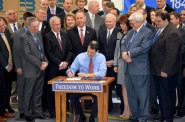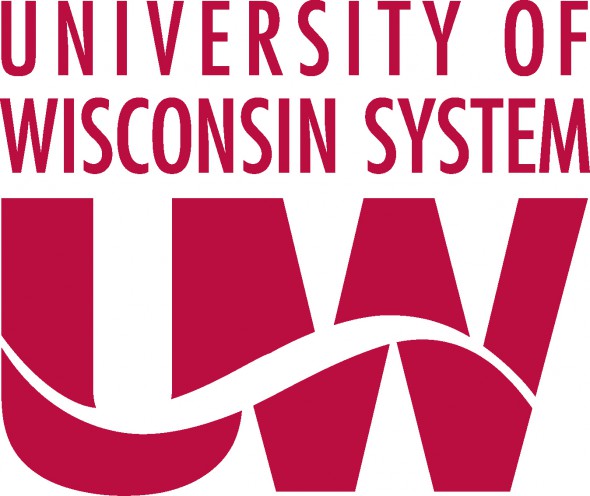UW System Needs Reorganization
Create true regional governance and move power away from Madison.
The reorganization of the 13 UW Colleges into four regional groups should be viewed as a first step toward a regional reorganization of the whole University of Wisconsin System.
Sadly, the consolidation of the two-year campuses, which now deliver some four-year degrees, was done strictly for budgetary reasons, not with strategic foresight.
Gov. Walker and the GOP-controlled legislature whacked the colleges by $5 million per year, after whacking them by $2.3 million in the 2013-2015 budget. These colleges have always operated in a very lean manner, and, remember, the building costs have been paid for by local property taxpayers, not the state. The latest cuts came on top of cuts under Democrats in previous budgets.
Further, for access reasons, tuition has been frozen at the colleges for most of the last decade, meaning no plus revenues from any source.
The successive withdrawals of support for our once esteemed university system was necessitated because political leaders of both parties have ducked the biggest budget buster for state government: out-of-control health costs for public employees and Medicaid recipients. That under-management, or mismanagement, call it what you will, means that other priorities get crowded out. The university in one in a long list of diminished priorities.
Are the Republican leaders real fiscal conservatives when they don’t deal with the largest fiscal crisis on their plate? Real fiscal conservatives manage fiscal challenges. They aren’t just slashers.
Cathy Sandeen, the new chancellor for the colleges and UW Extension, faced up to the fiscal realities imposed by the GOP and decided to take the cuts out of administration so instruction and students would be impacted as little as possible. That means at least 83 administrative positions will be eliminated on the 13 campuses, or about six or seven per campus. For perspective sake, the West Bend campus has about eight administrative positions at present.
When the reorganization shakes out over the next five months, the University of Wisconsin – Washington County in West Bend will probably be headed by an associate dean. The campus will no longer have its own dean, a loss since UWWC deans have long been prominent leaders in the county. The likelihood is that the regional executive officer will be based at UW – Waukesha, a larger campus than West Bend or Sheboygan in the new southeast regional grouping.
Many of the administrative functions will be shifted to the central office in Madison, and it remains to be seen how well administrators there do with student recruiting, raising money for scholarships and community engagement. They are a long way away from local action in the 13 communities. My guess is that the local deans and their small staffs will be sorely missed. If, for instance, recruiting stumbles and tuition revenues suffer, the fiscal stress on the campuses will be exacerbated.
That alignment doesn’t get done in Madison. Indeed, the central office of the UW System should be moved from Madison to the business center of the state, namely Milwaukee.
What would regional reorganization look like? There would be one chancellor for Southeastern Wisconsin, pulling together the campuses at UW – Milwaukee, Whitewater, Parkside, Waukesha, Sheboygan and West Bend. In addition to administrative savings, similar to what Sandeen is seeking on a smaller scale, the region would benefit from the presence of a large, powerful, world-class university with multiple campuses. The campuses could specialize in different disciplines.
Then do the same for the other regions of the state.
Oregon just followed exactly that model. Each of its major campuses is now run by its own governing boards. There is no central university office, though there is a higher education council that oversees all levels of education in Oregon.
Above all, we would want to turn the regional chancellors loose to do their own sourcing, including health care. They could save many millions by sourcing locally.
The Madison-centric model isn’t working well for communities like West Bend. It isn’t working well for UW – Milwaukee, which took a major hit this time around, just as it is trying to be a major player in lifting Milwaukee’s lagging economy.
Part of the political problem is that the UW System, based in Madison, has become very unpopular with the legislature. How did that happen, when many of them graduated from UW colleges?
A regional structure would elicit “homer” support from legislators across the state. There would be no monolith to tangle with. UW – Madison, with its liberal biases, would be one among seven or eight regional campuses. Each regional university, including Madison, would get the autonomy the system has been seeking.
The legislature, now a minority contributor of funds for the system, would have a hard time making a case against such autonomy. If you aren’t writing big checks, you shouldn’t be making the big calls.
The Republican leaders have an opportunity to create a blue ribbon commission to take a high-level, deep-running look at how the university should function in globalized, innovation economy. They need to look at our educational assets in a grand strategic way.
Just cutting blindly is not the answer that any Wisconsin citizen wants.
John Torinus is the chairman of Serigraph Inc. and a former Milwaukee Sentinel business editor who blogs regularly at johntorinus.com.
Torinus
-
How Hillary Could Win GOP Votes
 May 9th, 2016 by John Torinus
May 9th, 2016 by John Torinus
-
Walker Targets Health Care Savings
 Feb 2nd, 2016 by John Torinus
Feb 2nd, 2016 by John Torinus
-
Cheap Surgery on a Tourist Isle
 Jan 12th, 2016 by John Torinus
Jan 12th, 2016 by John Torinus






















Too bad the strategy to that makes people (strangely) happy when they see their property tax go down $5.00 and then vote for more of that won out. The average citizen doesn’t look past those short term gains…multi-year trends of what a strong education system does for a region goes unnoticed. “They” in the above sentence needs to be “the people of Wisconsin”, not the small collection of currently “Republican [legislators].” (Intentionally changed ‘leaders’ to ‘legislators’ in the quote, for ‘leaders’ they are not).
John keeps hammering this idea that the UW System central office should move from Madison to Milwaukee – why? Do Milwaukee businesses not have phones or email that they can use to contact people in Madison, a 1 hour drive away? While we’re at it, maybe we should move the Capitol to Milwaukee too; the same logic would apply – put the government where the majority of businesses are so they can all talk to each other better. I’m betting the rest of the state wouldn’t like it – to many, the state is already too focused on Madison and Milwaukee to the detriment of the rest of the state.
The UW System should foster better relations with in-state businesses and get individual campuses more involved in their local communities. But to pretend that UW-Madison ignores everything outside of Dane County is completely false – I have two degrees from UW-Madison, and my program had ties with businesses not only in Madison, but also Milwaukee, the Fox Valley, Chicago, Minneapolis, and many more places. That’s the benefit of having thousands of graduates throughout the state and country that feel a connection back to Madison.
The UW System should operate as one system – there’s economies of scale to be gained by having one system instead of 4+ different systems. The state understood this back in the 1970s when they combined the UW with the WSU system. That doesn’t mean individual campuses shouldn’t have more freedom to act independently in some areas; I bet that many of them already do in many areas where it makes sense and that should continue. To break the system up will eliminate those economies of scale but will do nothing to prevent the squabbling between the different campuses that so-and-so got more than we did. Take a look at Minnesota and how two university systems in one state operate – there’s plenty of acrimony there between the U of M and MNSCU.
Torinus continues to be a disingenuous pundit. Here he criticizes the blind cuts to the UW System and colleges, but offers no plan to resist those cuts. He also gets in a couple jabs at UW – Madison, the flagship campus, which he describes as “UW – Madison, with its liberal biases.” He talks about business as a model for running the system, but business, at least at larger scales, is largely conservative in outlook. So, he is not trying to mitigate a perceived bias; he is slyly advocating for an overwhelming conservative bias throughout the UW System. Really… why not have the courage to say that is what you’re after, John? The answer is that misdirection is more effective than plain talk.
I am not saying that regional approaches will always be wrong, but much like the electoral gerrymandering engendered by the current crop of WI legislators, the story is lacking in details about the most likely outcomes of these changes and the political motivations behind the actions. Instead, we read broad characterizations supporting a fictitious free market. As for UW – Madison. It is one of the best Universities in the world, contributes economic value to the state, and whatever Liberal bias it may have hasn’t rendered it ineffective or automatically wrong. Heck, I’ve been all over that campus, and some UW Madison colleges within the University are not that liberal. It’s far better to criticize specific policies from the administration at UW Madison, and the content of the research produced, if those things reveal content with which you disagree.
Torinus wields his hatchet with some degree of skill, yet the swipes he takes are overly broad, and largely unsupported by fact. If he is the product of a nearly perfect concept of Entrepreneurial philosophy, then he is surely capable of producing a strongly reasoned, better supported argument. Many of the students who emerge with a degree from the UW have been required to produce higher quality work than this, yet somehow, they are portrayed as mindless thralls of a Liberal university. I expect that any response from Torinus to this, if he not too risk adverse, will be as sketchy as his post. Too bad. Honest disagreement moves society much further.